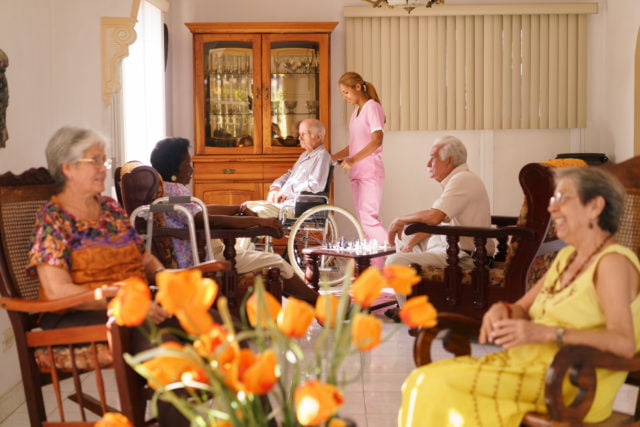Filter


Black Millennials’ Wealth is Sliding
It’s still too early to assess the full impact of the COVID-19 downturn on Millennials’ economic fortunes. But Black Millennials had already lost a lot of ground before the pandemic hit their communities hard. Their wealth in 2019 was just half of what would be expected based on how much wealth their parents’ generation had at the same age. Other Millennials are also running behind previous generations, but only slightly. And their situations have improved in recent years, while Black Millennials are sliding farther and farther behind. The Federal Reserve Bank of St. Louis called the situation “alarming” in its new report. The oldest Millennials are turning 41 this year. But in 2019, the typical Black family born in t…
May 20, 2021
Nearly Half on Disability Want to Work
An unfortunate misperception about people on federal disability is that they’re not interested in working. In fact, nearly half of them want to work or expect to go back to work, and that share has been rising. But getting or keeping a job has proved difficult, and the employment rate is very low for people who get Social Security disability benefits – or cash assistance from a companion program, Supplemental Security Income (SSI). Yet the vast majority of beneficiaries have past work experience that should help them in the job market. Researchers at Mathematica mined a survey of people on disability for clues about how to help them find a job or promotion or learn a new skill. Many of…
May 18, 2021
Tapping Home Equity – Retirees’ Relief Valve
One telling indication that retirees are in serious financial straits is when they take less of their medications or don’t fill prescriptions. Nearly one in four low-income retirees has difficulty paying for medications, despite passage of Medicare Part D in 2006, which reduced out-of-pocket drug costs. Between 2011 and 2015, the average Medicare beneficiary spent $620 to $700 a year on prescriptions, and people with diabetes, lung disease, and cardiovascular disease spent more than $1,000 a year. One way retirees can address such hardships would be to tap some of the equity in their homes. Although a homeowner probably wouldn’t use this strategy just to cover drug copayments, new research finds that older Americans who tap equity significantly increase their…
May 13, 2021
Psychology Added to CFP Certification
Financial advisers have no shortage of clever strategies to dispense to their clients. The tricky part is getting the psychology right. Human beings have all kinds of hang-ups about money. Presumably, someone who’s walked into a financial adviser’s office has broken through the first barrier to getting help: denial. But even then, blind spots and fears can get in the way of a client choosing or executing a financial plan, even if it’s clearly beneficial. To that end, psychology is being added to the educational curriculum – along with the longstanding topics like risk management, tax planning, and investing – required for advisers to get certification as a Certified Financial Planner, or CFP. Money “is a very emotional topic,” said…
May 11, 2021
Growing Job Demands Fall Harder on Some
As technology transforms the work world, jobs that were once routine might now require good interpersonal skills or the ability to quickly adjust to the situation at hand. The people bearing the brunt of these challenges are the same people who were already at a disadvantage in the labor force: workers who never attended college. New research on more than 700 occupations found that the types of jobs held by workers with only a high school education have become more difficult in recent years, which has sharply limited their job opportunities. The opposite is true for college graduates, whose jobs have gotten easier, opening up new opportunities for them. “The changing nature of work over the past 15 years may…
May 6, 2021
Home Equity Rises. Reverse Mortgages Don’t
The housing market has shrugged off the pandemic, and home prices are rising sharply due to historically low interest rates. The market crash more than a decade ago is a distant memory. The total value of the equity in older Americans’ homes has doubled since 2010, hitting $8.05 trillion at the end of last year. The irony is that federally insured reverse mortgages, which allow a long-time homeowner to cash in on tens of thousands of dollars of equity, aren’t very popular. Last year, only 42,000 Home Equity Conversion Mortgages (HECMs) were sold – half as many as in 2010 – according to the U.S. Department of Housing and Urban Development (HUD). One reason HECM reverse mortgages haven’t caught on,…
May 4, 2021
Retired People of Color Struggle with Debt
The oldest minority retirees are struggling with debt, a new Urban Institute study finds. The researchers’ starting point is that people generally reduce their debt as they age. To prepare for retiring, older workers try to pay down their mortgage balances and pay off credit cards. Once retired, their debt continues to shrink. But on closer inspection, retirees in their 70s and 80s in the nation’s predominantly minority neighborhoods have shed less of their debt than their counterparts in mostly white neighborhoods, who tend to be better off financially. In a sign of financial distress among the oldest lower-income and minority retirees, 20 percent of their loans go to collections for non-payment – double the rate for higher-income and whit…
April 29, 2021
5 Million Families Caught in an ACA Glitch
The states’ health insurance marketplaces will sell subsidized family policies to workers who have employer coverage on one condition: their employer premiums are deemed unaffordable. But this condition has a quirk. Under the Affordable Care Act (ACA), a worker is eligible to buy a subsidized family plan only if he can’t afford his employer’s premiums for an individual policy, defined in the law as exceeding 9.83 percent of his income. Policymakers argue this is the wrong standard, because the ineligible worker needs a family policy, and employers’ family policies usually have much higher premiums than their individual policies. The Kaiser Family Foundation estimates some 5.1 million workers are in this predicament, which is known as the “family glitch.” The majority…
April 27, 2021
Films about Dementia Help Us Understand it
“Supernova” does not have a happy ending. But that’s how stories about Alzheimer’s go, and the film, which recently began streaming, is worth watching. It’s one of those occasional movies that come along and portray the emotional aspects of this disease with nuance. The films, by using big-name stars like Stanley Tucci and Colin Firth in “Supernova,” lift some of the stigma around dementia that can isolate its victims and their caregivers. Dementia “is still very much a taboo topic,” said Bobbi Matchar, who, as director of the Duke Dementia Family Support Program, facilitates group discussions for people with dementia and their families. “Having movies that more accurately portray the face of dementia is really helpful.” The newest of thes…
April 22, 2021
How Many Kids Will 30-Somethings Have?
U.S. fertility is already at record lows, and women in their 30s have had only 1.3 children on average – well short of their expectations for more than two children. But they still have time left on their biological clock. So, will they catch up? Several factors are working specifically against the college graduates in this cohort. Religiously observant people usually have more children, and the decline in religious affiliation is reducing their fertility. Their fertility is also being hurt by the falling marriage rate, which leaves fewer couples ready to raise a family. In addition, the women’s careers often compete with having children. In a new study, Anqi Chen and Nilufer Gok at the Center for Retirement Research predicted…
April 20, 2021
First, Money Woes. 6 Years Later, Dementia
Gayle Blanton, the blogger’s mother My 85-year-old mother is on top of her bills. She pays several of them online, which is impressive enough, and she knows which bill is due when. So, we should both take some comfort in the fact that she is not having difficulty managing her money, which is an early sign of dementia. The connection between poor money management and declining cognitive capacity was established in research years ago. An obvious next question – when does this early warning system kick in? – is answered in The Journal of the American Medical Association. The researchers followed more than 81,000 men on Medicare for more than a decade and linked their medical records to their Equifax…
April 15, 2021
People Don’t Save for a Nursing Home Stay
About 13 percent of the older people in a recent study – average age 74 – who were initially living independently moved into a nursing home within five years. Perhaps because they know their vulnerabilities, their expectations of whether they would one day need nursing home care helped predict their actual nursing home use, the study found. In fact, the researchers said, the accuracy of the predictions showed that the older people must have taken into account personal information that went beyond what was apparent in the 1998-2016 survey data used in the study, which included details about their health, ease of functioning, and other influences on whether they need care. However, foresight did not translate into facing up to…















